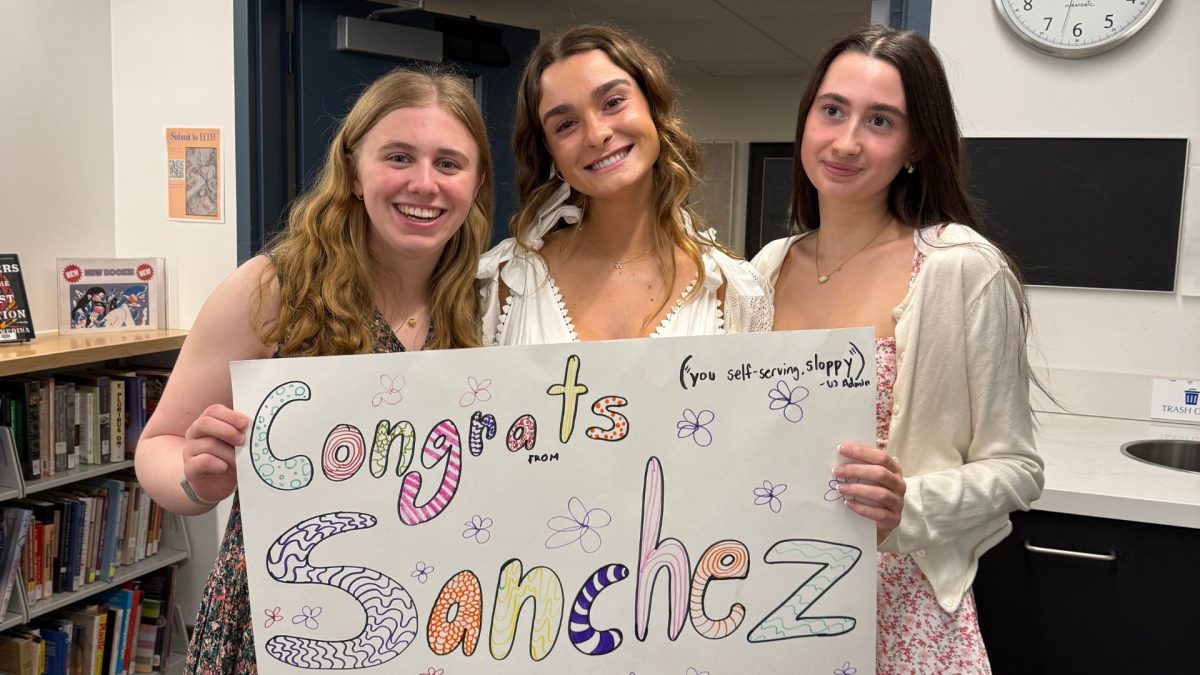Hedy Gutfreund
Co-Editor-in-Chief
[caption id="attachment_3414" align="alignnone" width="359"] Tiffany Madigan (CAASE Trustee), Ali Lieberman (LIFE Exec Member), and Kaethe Hoffer (CAASE Representative) at the LIFE/LAW breakfast on October 29.[/caption]
Let’s talk about prostitution.
Tiffany Madigan (CAASE Trustee), Ali Lieberman (LIFE Exec Member), and Kaethe Hoffer (CAASE Representative) at the LIFE/LAW breakfast on October 29.[/caption]
Let’s talk about prostitution.
That was not how I expected to start my morning on Tuesday, October 29, when Kaethe Hoffer and Tiffany Madigan came to talk about CAASE, the Chicago Alliance Against Sexual Exploitation, of which Ms. Hoffer is a representative and Ms. Madigan, a Latin alumna, is a trustee.
CAASE’s primary purpose is to prevent and educate people about sex trafficking. Their resources include programs where educators go into high schools to talk to boys, and there is a new curriculum for girls. CAASE also has a legal services department, which provides legal counsel for anyone over the age of fourteen for those under harm or under sexual exploitation.
Ms. Hoffer got her start in dealing with sexual exploitation and assault when she was a Planned Parenthood teen educator in high school. In addition to giving people information on birth control, Hoffer’s role expanded. She explains, “People started disclosing to me that they’d been sexually assaulted.” Ms. Madigan became involved in CAASE when her friend Rachel Durchslag, also a Latin alumna, founded it and needed the “practical side” of the organization. Madigan helps with CAASE’s finance matters.
Hoffer started out by explaining that prostitution is not a victimless crime. In the Chicago area, she says, 16,000-24,000 girls and women on any given day are involved in prostitution, most of whom are survivors of childhood sexual abuse and are sold for sex before the age of eighteen, often starting between the ages of fourteen and sixteen. In Hoffer’s words, “Many people see [prostitution] as a victimless crime, but it is an experience that lands in the lives of our most vulnerable people.” Prostitution and situations with pimps can often be “commercialized domestic violence.” As she notes, most healthy situations do not make girls go into prostitution at the ages of fourteen to sixteen.
One of the biggest problems, though, that CAASE addresses is the cultural portrayal and acceptance of prostitution and sex trafficking—which is far from the reality. “Taken,” Hoffer says, “is a false picture of sex trafficking as Pretty Woman is a false picture of prostitution.” Instead of focusing on normalized and idealized visions of prostitution, then, she says we must focus on the demand side of the problem. Most women in prostitution, who may have five to ten clients a day and work most days of the week, do not have repeat clients more than once or twice a month. A simple mathematical analysis shows that “the proportion of Johns is much greater than the number of prostitutes.” Most of these men, as Hoffer points out, “never face any consequence at all,” so even just arresting them can deter them, limiting the demand.
But beyond the media’s portrayal of prostitution, Hoffer and Madigan note that we, as young women and men, must change the way we think and talk about these issues. “Be critical of pop culture, be aware of the ways in which pop culture normalizes and glorifies harms of sexual exploitation,” Hoffer urged the group. We look at how culture can harm girls’ self esteem, but she also believes we must go further than this. She wants us to be aware of images that portray strip clubs being sexy and normal and that using the word “pimp” as something that is fashionable has far greater implications in normalizing prostitution. Hoffer also urges us to be critical of pornography, a word which literally means “pictures of prostitutes” and an industry that depends on taking pictures of people being sexually exploited. As Madigan says, it’s “a really difficult topic to talk about,” but this breakfast might just be one step in the conversation.
Mr. Fript, one of the few males at the breakfast, brought up the issue of male sexual exploitation. He reflected, “I recognize that this was designed for LAW and that the focus was going to be girls and women, but I was really pleased that they also realized that boys are also victims of sexual assault, that one out of six are abused. We don’t know how many are really abused, because boys won’t talk about it and when they do they get laughed at. We know that there are lots of boys out there that are prostituting themselves; we just don’t know how many.” He goes on, “Unless the guys around here realize that they or their sons can be as easily victimized as their daughters, we’re never going to get the guys into the conversations.”
Beyond that the issue of sexual assault and exploitation affects both men and women, the breakfast also sparked conversation outside of the Loggia. One boy I spoke to after the breakfast, who prefers to remain anonymous, argued, “In Holland where prostitution is well regulated, it doesn’t seem to be a problem. Maybe it’s like drugs. If you just regulated it, the girls involved wouldn’t be hurt.” While Hoffer and Madigan did not address this, the LIFE and LAW breakfast may act as just a starting point to the timely and often taboo issues that face Chicagoland and beyond.]]>


















































